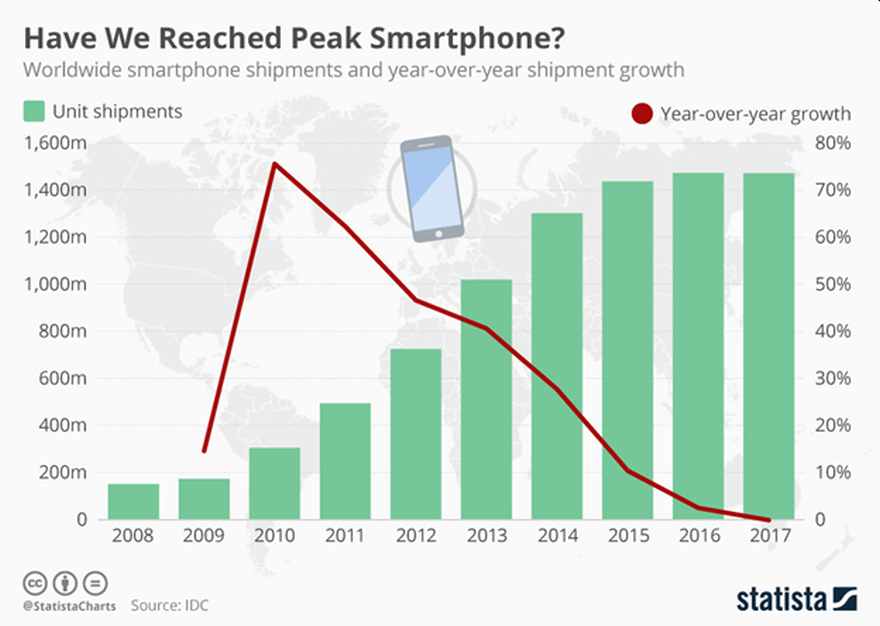What Does The Fall In Smartphone Shipments Mean For Tech Giants Like Apple?

Many people today cannot imagine life without their smartphones. These small devices are constantly by our side. But have you ever stopped to wonder what the future might hold? According to analysts at CCS Insight, there is a very high chance that smartphones are on the verge of technological extinction.

(Image Source: Statista)
A recent study by Gartner has revealed a sharp decline in smartphone shipments for the first time since 2004. Tech giants like Apple and Samsung are reportedly losing out on their opportunity to thrive on this decline in global shipment volume, as other companies like Xiaomi and Huawei make gains on the stagnant market.
The fall in smartphone shipments could be linked to a multitude of reasons, including wider adoption of cheaper devices from emerging market giants, decreased mobile app purchases caused by increased usage of social media apps, or much more affordable Smart TVs produced by other companies like Samsung or LG.
The study has also predicted a significant fall in tablet shipments. Apple is estimated to have lost around $16 billion in annual revenue due to the decline in smartphone shipment volume. During the same period, Xiaomi, which is barely into its 2nd quarter of operations, has already gained around $5 billion of annual revenues (that’s equivalent to around 15% of Apple’s annual revenue).
What does this mean for investors and tech giants such as Apple?
The fact that other companies like Xiaomi are making gains in the global smartphone market despite a lack of data on their popularity with consumers only proves the technology industry’s trend toward commoditization.
The issue of saturation is not just an issue in telecom services but also in the entire technology industry. With the widespread adoption of smartphones in emerging markets and the increasing availability of affordable devices, we could be seeing a shift to more specialized devices like wearables and other personal tech gadgets.
While smartphones still account for around 80% of internet usage, there’s still a huge share of growth left for non-mobile applications. This could also spell great news for more niche tech companies like Google, which has been investing heavily in wearable technology.
The rise in the use of social networking apps could also be contributing to the fall in smartphone shipments.
With improved connectivity, people are spending more time online, but not necessarily on their mobile devices. There’s been a continuous rise in smartphone use around the world, but there has been a constant fall in profit per user (both for Apple and Samsung).
What is causing such a dramatic decline?
There are a number of factors contributing to the dramatic decline in smartphone shipments. From significant price rises in line with global inflation to the fact that smartphone consumers are simply switching to alternative gadgets, here are some of the key factors affecting the market:
1) High-end smartphones are overpriced
Smartphone lovers have been eagerly waiting for Apple or Samsung to release their latest handsets. Unfortunately, these flagship devices cost an arm and a leg for consumers. With a high starting price, all those iPhone and Samsung users who have been saving for months to afford their latest device, are starting to think twice.
2) Smartphones are not smart enough
The main reason why many people love their smartphones is the convenience factor. How nice would it be to have all your content on one device? In reality, however, smartphones are not living up to their potential. Many people today are struggling to connect their devices and applications seamlessly. This is mainly due to an outdated operating system that has not been updated in years.
3) Smartphones are too expensive to be adopted by mass-market consumers
There are two main factors behind the declining smartphone sales. One is the high price tag, and the other is that smartphones are still not as advanced as they could be. As a result, smartphone usage is not growing the way manufacturers would have hoped it would have been:
“The low cost of smartphones has contributed to increased adoption in emerging markets, but a more balanced specification between high-end and low-end handsets will go some way towards addressing this issue” – Gartner
4) Smartphone consumers are switching to other gadgets
Smartphones have been grabbing all the headlines in recent years, but they do not have a monopoly on consumer tech. Users are increasingly turning to other devices with more advanced functions, such as virtual reality headsets.
5) Smartphones are becoming obsolete
If you don’t believe smartphone sales will decline any further, think again! The number of used tech in British households is estimated to be worth £16 billion collectively.
This means that the average smartphone user must replace their device three times over the course of five years. Not only is this inconvenient for users, but it also poses an enormous strain on the environment.
Looking To The Future
As we step into the future of the smartphone market, mobile giants such as Apple and Samsung will have to compete against new forms of specialized tech on the market. The question is, could the globe’s continually expanding tech sector see smartphones go extinct one day?

